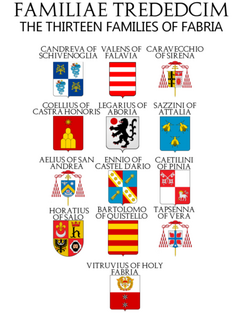The Thirteen: Difference between revisions
No edit summary |
No edit summary |
||
| Line 2: | Line 2: | ||
All thirteen families have produced [[Pope of the Fabrian Catholic Church|Popes of the Fabrian Catholic Church]], {{wp|Cardinal (Catholic Church)|Cardinals}}, [[Nobility of the Ecclesiastical State|nobility]], {{wp|Artists|prominent artists}}, military commanders and business people throughout their histories. So interwoven into the Ecclesiastical State, that the thirteen families share a common tradition of producing sons for specific roles, with the general consensus arguing that the families "bare a son for business, for the army and for the church." | All thirteen families have produced [[Pope of the Fabrian Catholic Church|Popes of the Fabrian Catholic Church]], {{wp|Cardinal (Catholic Church)|Cardinals}}, [[Nobility of the Ecclesiastical State|nobility]], {{wp|Artists|prominent artists}}, military commanders and business people throughout their histories. So interwoven into the Ecclesiastical State, that the thirteen families share a common tradition of producing sons for specific roles, with the general consensus arguing that the families "bare a son for business, for the army and for the church." | ||
[[File:ThirteenFamiliesoftheES.png|250px|thumb|right|Coat of Arms of the Thirteen Families of Fabria.]] | |||
== History == | == History == | ||
=== Emergence === | === Emergence === | ||
Revision as of 19:54, 15 March 2019
The Thirteen, officially, The Thirteen Families (Latin: Familiae Tredecim) is the term used to describe the thirteen wealthiest and most influential families in the Ecclesiastical State. These thirteen households have exercised immense influence and power in the economy, society and politics of the Ecclesiastical State, as far back as the Renaissance and remain prominent today, providing many leading figures in society and politics.
All thirteen families have produced Popes of the Fabrian Catholic Church, Cardinals, nobility, prominent artists, military commanders and business people throughout their histories. So interwoven into the Ecclesiastical State, that the thirteen families share a common tradition of producing sons for specific roles, with the general consensus arguing that the families "bare a son for business, for the army and for the church."
